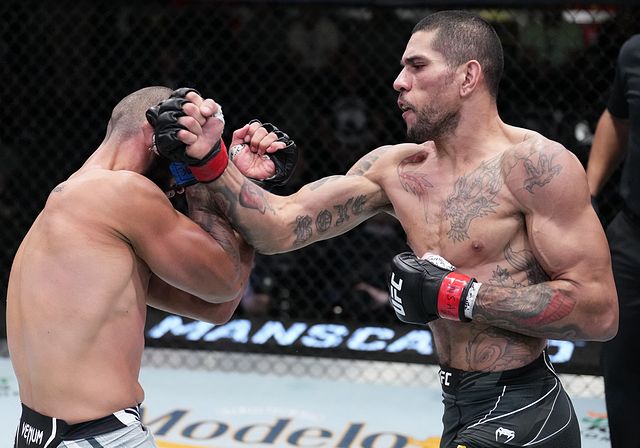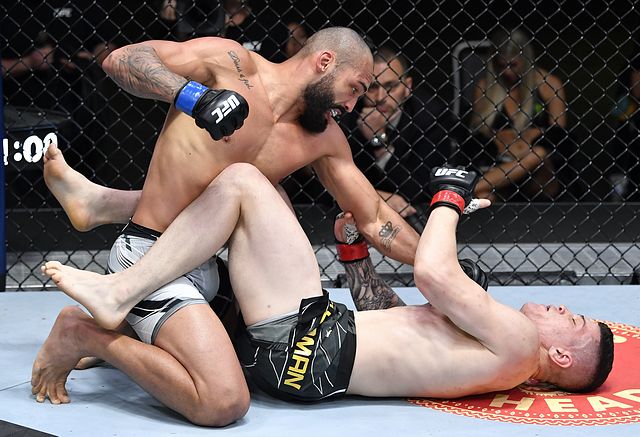Bruno Silva, Armored for Battle
Sign up for ESPN+ right here, and you can then stream UFC 269 live on your smart TV, computer, phone, tablet or streaming device via the ESPN app.
Advertisement
Full name?
“Bruno Arruda da Silva.”
What's the origin or meaning of your nickname?
“My nickname in Blindado [‘Armored’ in Portuguese]. That came from a fight in 2010 when I faced a guy who weighed 30 kg [66 pounds] more than me. I lost the first round but I beat him in the second. From that, I was given my nickname. At the time, I didn’t like it. But with every fight, the meaning became stronger. Today, everyone knows me as Bruno Blindado.”
Age?
“[Born] July 13, 1989. I’m 32 years old.”
Height?
“1.85 m [6 feet, 1 inch].”
Weight class?
“Middleweight (84 kg / 185 pounds).”
What team do you belong to?
“I belong to Evolucao Thai. And I work on my ground skills at Sapo Grappling.”
Where were you born, and where do you live today?
“I was born in Sao Paulo [Brazil]. But I see myself as being from the state of Paraiba. It’s the land I love and represent. And over the past seven years, I’ve been living in Curitiba.”
How did you get started as a professional MMA fighter?
“I started training in 2009. I didn’t start up in martial arts. I grew up playing soccer. After I started training in martial arts, I liked it, and decided to take a fight. I used to live in a small town in the interior of the Paraiba state. There were no academies there. The more I fought, the more I enjoyed it. After I lost my father, fighting was very beneficial in my life. Since that time, I’ve had 27 pro MMA bouts. If I were to count other arts like jiu-jitsu, muay Thai, and boxing, I’m up to around 50 bouts.”
Could you describe some of the challenges at the start of your career?
“The start of my career was difficult. I had no structure. I didn’t have access to a training space. As one can see on my professional record, I lost several fights by submission since I had nowhere to train. I trained in the streets, or in the city square – wherever I could. It was a new sport in my town, and almost no one practiced it. I was the crazy guy who enjoyed getting into fights. It was a different time. Today, there are managers and amateur leagues. Back then, you started out as a professional. I was a white belt facing black belts. Often, I’d face much heavier opponents. I ended up having several alternating wins and losses.”
How did you switch things up to become a highly successful fighter?
“I got to know Luis Barbosa who became my coach. With him, I managed to go on a six-fight unbeaten streak. Once I got to Evolucao Thai, I started to focus more on my ground game – my jiu-jitsu. In the last nine years or so, I’ve only had one loss. I spend a lot of time working on my ground. I’m primarily a striker but I have good ground skills. I’m working on being able to win by submission. Ultimately, I’m an MMA fighter. I’m not a jiu-jitsu, muay Thai, or wrestling fighter. I’ve always trained MMA. I didn’t go to style-specific schools.”
Did you get emotional or financial support in your career choice?
“When I chose my career path, I was frequently called insane. It was a new sport in my area. My mother and the rest of the family were somewhat neutral. They didn’t support my choice, but at least they didn’t criticize it. In my town, almost no one believed in me. There were no sponsorships. Only a few friends helped me out. I had nearly zero support. Today that’s changed. Most folks there believe in me now. Once you become a champion, it’s easier to change minds. In the beginning, I was seen as crazy. I proved I wasn’t crazy. I proved that I am courageous and that I could become a champion. I accomplished that.”
What sorts of jobs did you have until you were able to make a living from MMA alone?
“Early on, it was impossible to live from fighting alone. I spent years balancing fighting and other jobs. For five years, I worked as a security guard, worked in social projects, and studied. That was in addition to being a fighter. I had no social life. I ended up having little contact with my friends and family. I had to pay my dues to become a fighter. Gladly, it worked out in the end.”
Talk about fighting in Russia.
“In Russia, I won three times by knockout. In the most feared place in the world, I turned the lights out of three opponents, one of whom was [former Bellator champion] Alexander Shlemenko.”
Can you elaborate on your failed PED test, which delayed your UFC debut by two years?
“I should have fought in the UFC in 2019, after beating several Russians, but it didn’t happen due to USADA. I spent a lot of money to prove my innocence. But whatever USADA says becomes the absolute truth. There’s not much to say. There’s no changing their minds. I spent more than 40,000 Brazilian reais [around USD $10,400]. If I had taken that substance, I wouldn’t have spent so much money to prove my innocence. Unfortunately, it didn’t work. Gladly, nothing bad came of it. I’ve always been good with my finances, and I still had money I’d earned in Russia. I used that break to spend time with my family after the birth of my daughter, and to weather the pandemic. I ended up having my UFC debut in 2021. I’m done talking about USADA. I suffered from it. It’s a wound that hasn’t healed.”
You scored a bonus after knocking out Andrew Sanchez in October. How does that change your life?
“The UFC hasn’t paid me the bonus yet. There’s been some sort of delay. But I’m sure it will be resolved. That kind of money not only changes my life, but that of the people I care for. With every fight, I look to use my earnings to help out my loved ones – people who are part of my life. And I’m investing in my future.”
What can you say about your new opponent, Jordan Wright? How do you see yourself beating him?
“I watch very few opponent videos. My work is 100% focused on improving myself – my weapons, my physical and mental sides. Jordan deserves to be in the UFC. Even bad UFC fighters are good fighters. I feel like he avoids close exchanges. He fights at distance and throws dangerous strikes. But I’ll chase him. My goal is the same as always – I'll look to turn out his lights. It’ll be my 19th career knockout win. I’ve fought inside and outside Brazil. I’ve traveled a long way to be in the UFC.”
Could you share some details about your training?
“I only train in one place. I don’t like to hop around for different training camps. I like my team. I’ve been at Evolucao Thai for almost eight years. My coaches, training partners, physical conditioner, nutritionist, and sports psychologists are all the same.”
What are your plans for the future? Do you have any opponents in mind?
“After this next win, I’d like anyone in the top 20. And there are two guys I’d love to face one day – Kelvin Gastelum and Robert Whittaker. I respect and admire them both. I think the fans would enjoy our clashes. For now, I’ll take anyone who can get me into the rankings.”
Anything else you’d like to share?
“I appreciate the positive energy and love I receive from my fans. My goal is to be the best knockout artist in middleweight history. I’m part of a new generation, but I fight with an old style – like ‘Minotauro’ [Antonio Rodrigo Nogueira], Wanderlei [Silva], and ‘Shogun’ [Mauricio Rua]. Those guys didn’t run from a fight. That’s my style. For me, fighting isn’t math. Fighting is about who gets the finish.”
« Previous Opinion: Retaining the Magic and Wonder of MMA
Next The UFC Lightweight Title: A Visual History »
More




 UFC News & Features
UFC News & Features



















































